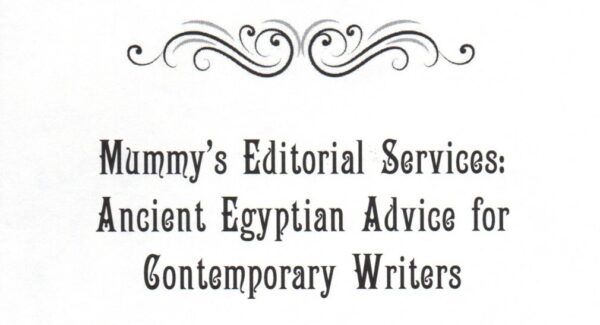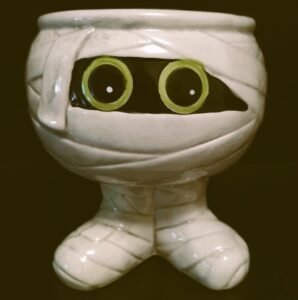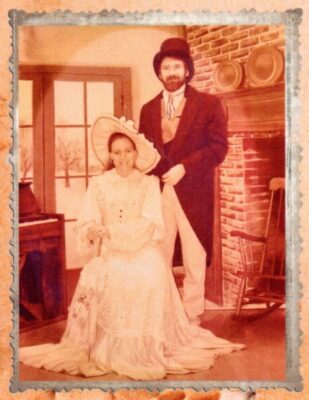
Night had fallen long since, the lights extinguished in the neighbors’ houses. Corelli’s Opus 6 concerti grossi played quietly on my CD player, and the dogs snored behind my chair. I, however, slumped in front of my computer screen, forcing my tired eyes to focus on a short story. On the desk lay a rejection slip. In pre-printed phrases it suggested my story was too confusing, indulged in side trips, and didn’t begin at the beginning. My weary mind tried to find ways to fix the flaws.
I don’t know how long the scratching on the sliding door had been going on before it penetrated my benumbed consciousness. A shadowy figure stood on the deck. The dogs hadn’t awoken, so I figured the nocturnal visitor wasn’t a burglar; I stepped over the canine dreamers and slid the door open.
“My card.” The voice was a hoarse whisper; like that of a smoker. The night breeze carried a scent I couldn’t identify. It reminded me of buried cities, of ancient perfumes, of hidden mysteries. Sandalwood, perhaps, or frankincense.
“Mummy’s Editorial Services.” I turned the square of yellow papyrus over. “Did my mother send you? She’s not an editor,” I said, squinting into the shadows. “She rather likes my writing.”
The figure rustled closer. “I’m here to help you.”
Something in the visitor’s manner made me shiver. “I’m quite capable of correcting my own flaws—”
“The service is free,” my visitor croaked. “You can use the help and pass it on.”
I frowned. “Is this some sort of pyramid scheme?”
“Funny you should mention pyramids.” My guest moved past me into my office. “A good story should be shaped like a pyramid. It should have a firm base, a solid foundation. From there, it should move inexorably towards a point, or climax.” The rejection slip fluttered to the floor in the breeze. “Does your current story-in-progress do that?”
I thought. My story has an ending. But a climax? “Well…”
For the first time I could see my visitor clearly. Poor chap had obviously been involved in a dreadful accident; bandages swathed him from head to toe. His eyes glowed red from slits cut in the rotten fabric.
“You need to be rewrapped,” I said. “You have loose ends.”
“A story needs to be tied up, too,” he whispered. “If you bring in something, and attach significance to it, don’t forget it later. Readers want to know what the secret letter contained, what was said in the telephone call, who the visitor in the night was.”
“Good point,” I said. “Loose ends leave a reader feeling stiffed.”
“I know the feeling.”
“Look, I’ve got a roll of gauze in the bathroom—”
“I’m not attractive, am I?”
“Quite well preserved,” I said, trying to be diplomatic, “considering the circumstances.”
“Was your story packaged attractively?” He leaned against my desk. The scent of ancient perfume became stronger. “Editors appreciate manuscripts that look professional. Nobody wants to read one full of wacky fonts and plagued by poor formatting.” He moved his bandaged feet to avoid a dog.
I wondered why the dogs didn’t wake up.
I noticed a little cone of sand developing on the floor beside my visitor. It was brown, the same as his bandages.
He must have seen it too. “Dryness can kill a story,” he said. “Writing can be as arid as the desert. Your story shouldn’t read like an academic exercise full of info dumps.”
I glanced at the computer screen. I suppose parts of it were too expository. With too many big words. Perhaps this guy was on to something. I pointed to the couch. “Have a seat.”
As he did so, something dropped to the carpet. I looked down in time to see something scuttle under the couch. A scarab beetle?
“Let me guess,” I said. “Have I worked out all the bugs?”
 He might have smiled, but the bandages around his mouth merely crinkled. “In my day, we never figured out a spell-checker to work on hieroglyphics. But misspelled words and typographical errors are signs of carelessness. So are grammatical glitches. So are unnecessary adverbs and adjectives.”
He might have smiled, but the bandages around his mouth merely crinkled. “In my day, we never figured out a spell-checker to work on hieroglyphics. But misspelled words and typographical errors are signs of carelessness. So are grammatical glitches. So are unnecessary adverbs and adjectives.”
He extended a bandaged hand towards the screen. “If you want to be treated like a professional, make sure your manuscript looks professional.”
“I don’t know how you found me,” I said, “but I’m glad you came.”
“Some things in life will always be unclear. In my country, we have the Sphinx, a poser of riddles. Don’t write like the Sphinx. Strive for clarity. Watch out for sentences that are so abstruse they leave readers shaking their heads. Your readers won’t like being left in the dark.”
I’m certain I sighed. “Believe me, I know about being in the dark.”
From outside, a dog barked. But it was none of the neighborhood dogs.
Bandages cracked as my visitor turned towards the door. “Jackals,” he grated. He showed me where ragged strips of bandage dangled from his arm. “Don’t let them get you.”
“Jackals?” I repeated. In Montana? “Coyotes, maybe…”
“Rejection slips,” he replied. “Destructive criticism. Negative reviews. Writer’s block. Despair. Apathy. Fear. Jackals.”
I grasped his point.
“Here.” He passed an object to me.
My hands trembled as I accepted an alabaster jar. Afraid of dropping it, I set it gently on my desk. The lid rattled, but I didn’t dare lift it. “A canopic jar?” I guessed.
His neck inclined. “Your story needs a heart. It needs guts. It needs muscles and sinews. Otherwise it’s an empty shell.”
My eyes flicked from my guest to the jar and back again. An uneasy thought quivered in my mind.
With a fluttering and a creaking he rose to his feet. “I must be going.”
I handed the jar back to him. “You’d best keep this.” The dogs still slept. Again, he stepped over them.
“You forgot this.” I stooped and retrieved a finger from the couch.
He held up bandaged stumps. “Make sure none of the parts are missing. A story needs a beginning, middle and end. It needs living characters. It needs vivid writing, clear descriptions, realistic dialogue. It appeals to the senses, the emotions, the mind, the spirit, the imagination. It has a hook and a climax. It has conflict. It has situation, setting and plot. Point of view. A focus. Good transitions.”
I made quick notes.
“And there are things it doesn’t need,” he continued. “Affectations, fluff, padding, pretensions. Verbiage simply to increase the word count.”
“Dead weight,” I added, and clamped my lips shut.
With a final hint of fragrance, he stepped into the night.
“Thanks for coming,” I called, but only shadows stood on the deck.

I raised my head from the desk, where it had been pillowed on my arms. My eyes ached, my head felt full of fuzz. Morning light streamed through the window.
I recalled my visitor of the night before, and glanced around the office. I’d been dreaming, surely. Working too hard on a story. Letting my brain get overtired.
And yet…
There it was, clutched in my fist. A square of yellowed papyrus, crumbly with age.
Mummy’s Editorial Services.
And then movement in the kitchen, my wife making the morning pot of tea, and calling to me. “What have you been doing? There’s sand all over the floor!”

Editor’s note: This post is a chapter from Andrew Seddon‘s fun, funny, and helpful book Dr. Andrew’s Curious & Quirky Compendium of Hints, Helps, Perils, Pitfalls, Constructive Comments and (Hopefully) Awesome Advice for Aspiring Authors.

Jess Elliott
You have outdone yourself! This is utterly charming! Sharing!
Andrew
Thanks so much, Jess! Glad you liked it!